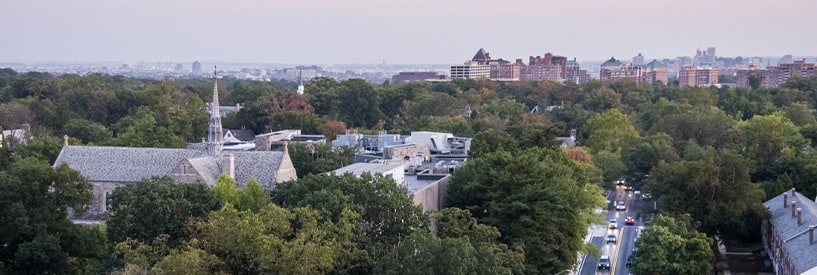Innovation & Justice: Our shared vision for a just and peaceful world

Loyola draws on its 500-year Jesuit tradition to prepare graduates who don’t just recognize injustice—they take meaningful, thoughtful action. With your support, students and faculty deepen their engagement in issues of peace, equity, and justice, becoming the leaders our world urgently needs today and tomorrow.
Key Initiatives
Loyola Angels Fund
Underrepresented entrepreneurs have long needed access to capital to grow their businesses. Loyola and its supporters want to challenge these inequities and be a force for transformation in Baltimore and beyond.
The Loyola Angels fund is an interdisciplinary program that gives students hands-on experience with angel investing while supporting underrepresented founders—especially women and minority entrepreneurs —in Baltimore and beyond. Students take courses in equity and finance, then help make real investment decisions to support job and wealth creation.
Simon Center for Innovation & Entrepreneurship
The Simon Center for Innovation & Entrepreneurship (SCI&E) catalyzes Baltimore’s economic growth by supporting innovation, entrepreneurship, and job creation—especially in underserved communities—while integrating student learning with civic leadership.
The Simon Center's mission is to elevate innovation and entrepreneurship at Loyola. Our vision extends beyond the University campus into Baltimore, where the Simon Center is a part of transforming Baltimore through our support for wealth creation and job creation driven by underrepresented entrepreneurs and innovators.
Karson Institute for Race, Peace & Social Justice
Founded in 2020, the Karson Institute for Race, Peace & Social Justice provides a space for researchers, students, social justice workers, and activists
to research, discuss, debate, and explore answers to America's most urgent questions
on inequality, injustice, and racial inequity. Karsonya "Kaye" Whitehead, Ph.D., professor
of communication, African, and African American Studies, is the founding executive
director of The Karson Institute.
Using Baltimore as a lens and healing justice as a framework, The Karson Institute
researches issues, collects and houses resources, and trains students and faculty
on how to actively address racial trauma and violence, anti-racism and anti-blackness,
and systemic oppression.
The Karson Institute has three Centers—the Center for Public Engagement, the Center
for Teaching and Learning, and the Center for Research and Culture.
Faculty and Curriculum Development Initiative
Funding helps strengthen justice education at Loyola by building inclusive classrooms, expanding the diversity-justice requirement, supporting faculty development, and enhancing course offerings related to power, privilege, and equity.
Through this initiative, Loyola can invest in areas that are critical to the Jesuit, liberal arts education that prepares our students to be ready for anything and everything. Support in this area can strengthen the Equity and Inclusion Faculty Fellows program and accelerate department-led initiatives to enhance the diversity and justice education Loyola offers.